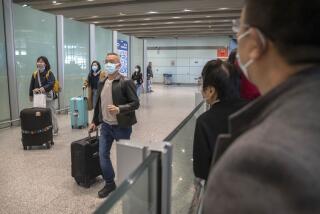Taiwan to Relax 38-Year Ban on Visits to China
- Share via
BEIJING — The Nationalist government of Taiwan plans to relax a 38-year-old travel ban and allow at least some of its citizens to visit mainland China, Taiwan’s Premier Yu Kuo-hua said Monday.
While the new policy is based largely on humanitarian considerations, it is also aimed at influencing political developments in China by spreading knowledge of Taiwan’s economic and political development, Yu told foreign journalists in Taipei, capital of the island state.
“We are now ready to launch an offensive, not of weapons, but of something much more powerful--ideas,” Yu said, according to news agency reports.
‘Viable Alternative’
“It seems clear to us that the most effective tactic in this war of ideas is to offer the people of the mainland an alternative more viable and attractive than the Communist system . . . namely freedom, democracy, the prosperity of free enterprise and stability and security under the rule of law,” Yu said.
The Communist government in Beijing, far from feeling threatened, has welcomed recent indications that Taiwan might change its policy, and it has expressed the belief that such visits will contribute to the ultimate reunification of the island and mainland China.
“The Chinese government has always advocated free exchanges between the people across the Taiwan straits,” the official New China News Agency said in a commentary last month.
The Nationalists have maintained a policy of “no contact, no compromise and no negotiations” with Beijing and have insisted that any relaxation of the travel ban would not constitute a change in this “Three No’s” policy.
“Our commitment to (this) principle . . . remains as firm as before,” Yu said Monday.
The official Beijing Review said last month that if Taiwan relaxed control over residents who want to visit relatives on the mainland this would “help eliminate the estrangement between both sides of the straits.”
But the magazine argued that there is a “powerful popular demand for exchanges of mail, trade and air and shipping services” and that the government in Taiwan should also agree to allow this type of communication.
About 2 million people fled to Taiwan in 1949 when the Nationalist government took refuge there after the Communist victory on the Chinese mainland. Many still have families on the mainland.
In recent weeks, officials in Taiwan have discussed the possibility of allowing citizens 55 and older to visit their relatives in China. But there has been considerable protest in the press and among citizens who argue that many elderly people would not be able to make such a trip without being accompanied by someone younger.
Yu said that in formulating the new policy, “we are trying to make as few restrictions as possible.”
The new rules will be announced later this month, Yu said. He did not say when they would take effect.
The new policy will legitimize, and almost certainly increase, what is already a considerable flow of visitors from Taiwan to China. The mainland is believed to have welcomed about 10,000 people a year from Taiwan in recent years, most of whom try to keep their trips a secret from the authorities in Taiwan. But even when the Taiwan government has learned of visits, punishment has generally been limited to a two-year suspension of the right to travel abroad.
Two reporters from Taiwan’s Independence Evening Post made a deliberately high-profile reporting trip through China last month in defiance of the travel ban. After their return to Taiwan, officials said they would face criminal charges for filing false applications for overseas news reporting ostensibly only in Japan.
More to Read
Sign up for Essential California
The most important California stories and recommendations in your inbox every morning.
You may occasionally receive promotional content from the Los Angeles Times.













